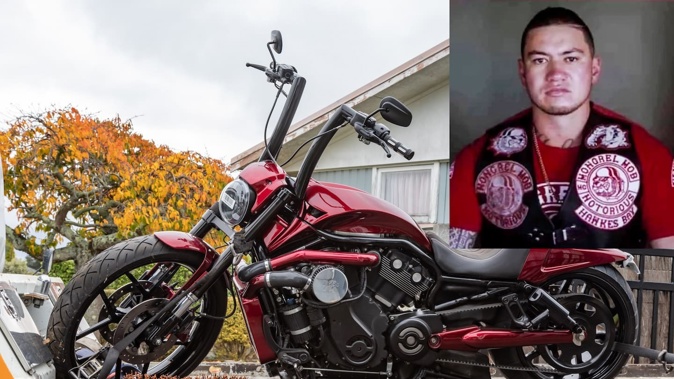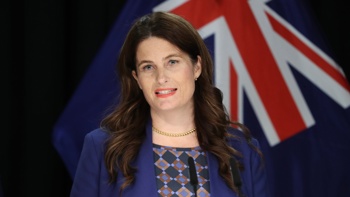
Warning: This article is about suicide and may be distressing for some readers.
- Joseph ‘Triple J’ Morrell was the captain of the Notorious chapter of the Mongrel Mob in Hawke’s Bay.
- The 34-year-old was the target of Operation Dusk, which investigated the source of his unexplained wealth and seized $2.1m of assets in 2021.
- Several weeks later, Morrell’s wife found him dead. A coroner has now ruled the death was suicide.
A young Mongrel Mob leader died by suicide shortly after police seized more than $2 million of assets as part of an investigation into his unexplained wealth.
Joseph John Morrell, 34, was the “captain” of the Mongrel Mob Notorious chapter in Hawke’s Bay until his sudden death in May 2021.
Only a few weeks earlier, the police had been granted High Court orders to freeze five residential homes, six vehicles, three Harley Davidson motorcycles, $74,000 in cash and bank accounts, a boat, and a Kobelco digger following an investigation into Morrell’s financial affairs.
Morrell was the main target of Operation Dusk in which detectives were able to prove the Mongrel Mob boss was able to live a lifestyle beyond his means – a declared annual income of $35,000 – because of criminal profits.
Although he had not been charged with criminal offences yet, Morrell had “not been coping well” since the seizure of his property, according to coroner Mark Wilton who outlined the circumstances leading up to Morrell’s death in a ruling released this morning.
In the week before his death, Morrell’s wife said he was “agitated” and would go around the house thumping his fist into his head. Most nights that week, his wife said, Morrell would get up 20 or 30 times from bed, get dressed and go outside.
Morrell “had a lot going on in his head”, his wife said, and she stopped her husband from attempting self-harm every night for five days leading up to his death.
“Other whānau had also been trying to keep an eye on Mr Morrell too, due to concerns for his mental state,” coroner Wilton wrote in his findings, released to the Herald this morning.
“It was suggested to Mr Morrell that he go and see a doctor, and he replied ‘he was not crazy’.”
On the evening of the May 20, 2021, Morrell and his wife went to bed about 10.30pm. A few hours later, she woke up to discover her husband was missing.
She found him outside, unresponsive.
Despite his wife performing CPR until the ambulance arrived, Morrell was unable to be revived.
The method of suicide cannot be reported, but Morrell also suffered a head injury, which was bleeding.
There was also a bloodied T-shirt near his body and a smeared area of blood about 10m away.
Although a forensic pathologist concluded the head injury did not cause his death, the police still had to consider whether Morrell was a victim of foul play.
Coroner Wilton said there was no direct evidence to suggest how Morell may have received the head injury.
“There were no signs of a struggle at the scene and police are of the opinion the head injury was self-inflicted,” coroner Wilton said.
“The area of blood that had been smeared also had droplets of blood on top of the smear marks, indicating Mr Morrell had attempted to clean up the blood using the T-shirt.”
Coroner Wilton was also satisfied the head injury was self-inflicted and Morrell had died by suicide.
“It appears Mr Morrell was concerned about the police investigation and the seizure of his whānau’s assets and may have been concerned about the filing of criminal charges in relation to the police investigation,” he said.
“The tragic circumstances of Mr Morrell’s death provide an appropriate opportunity for me to remind the public of New Zealand that help is available to anyone who is struggling and thinking of harming themselves.”
Joseph "Triple J" Morrell, 34, was a father of five children and captain of the Mongrel Mob Notorious chapter until his death in May 2021. Photo / Supplied
Following his death, the $2.1m of assets restrained in Operation Dusk were forfeited under the Criminal Proceeds Recovery Act, a law under which the police do not need a conviction.
They have to show only that someone profited from criminal offending to the lower standard of proof applied in civil cases – “on the balance of probabilities” – rather than surpassing the more difficult “beyond reasonable doubt” threshold for criminal cases.
Court documents obtained by the Herald reveal Morrell accumulated the assets despite his tax records showing he declared an annual income of only $35,000.
Forensic analysis of his bank accounts showed cash deposits of $233,402 and another $185,148 in cash spending, although detectives believed the total was likely to be higher.
This included a 12-day family holiday to French Polynesia in January 2020, during which the $32,678 bill was paid in bundles of cash.
On their return home, Customs searched the Morrell family’s luggage and found $13,500 in cash that was not declared.
Another family trip, to Taupō in May 2020, was also paid for in cash, including skydiving ($3860), hotel accommodation ($5600) and a 4WD excursion ($1163).
Apart from the significant amounts of cash, Morrell and his wife were able to purchase five residential properties in Hawke’s Bay. One was the home where they lived with their five children, and four were rentals. They collected $151,000 in rent payments over four years, although this income was not declared to Inland Revenue.
All the properties had been extensively renovated, which again had been paid for in cash.
Morrell also had a fleet of cars, including vintage Fords, which are prized by the Mongrel Mob, and a trio of expensive Harley-Davidson motorcycles.
Most of these vehicles were registered in the names of family – including his teenage son who didn’t have a driver’s licence at the time – and friends in order to distance Morrell from his ill-gotten gains.
“[Morrell and his wife] are living an extravagant lifestyle that is well outside what their declared income should allow them to enjoy,” Detective Sam Buckley wrote in an affidavit to the High Court.
“This demonstrates his access to a significant ‘unknown’ source of cash, which … supports a belief that this cash is derived from crime.”
Buckley, the officer in charge of the financial investigation, put this down to Morrell’s position as the captain of the Mongrel Mob Notorious chapter in Hawke’s Bay.
He outlined several investigations that confirmed senior members of the Notorious chapter were responsible for the wholesale distribution of methamphetamine throughout Hawke’s Bay.
“As a senior member of a hierarchical organisation, I believe [Morrell] will be aware of the proceeds of this offending, assisting in its facilitation and gaining benefit from it,” Buckley wrote in his affidavit.
“The combination of excessive and unexplained cash availability, when combined with his past criminal disposition and current behaviours, support grounds for belief that [Morrell] is actively involved in serious crime, likely to be drug dealing and money laundering.”
Jolene Patuwai-Morrell said her younger brother was born into the Mongrel Mob, but he was more than just a gang member.
“Another ‘gang member’ swept under the justice system’s bias, another life reduced to a stereotype. But to us, he was so much more,” Patuwai-Morrell told the Herald.
“A son to our mum, who missed him dearly. A brother I adored. An uncle who loved unconditionally.”
 Cash seized by police in Operation Dusk, which was an investigation into the unexplained wealth of Mongrel Mob Notorious captain Joseph Morrell. Photo / NZ Police
Cash seized by police in Operation Dusk, which was an investigation into the unexplained wealth of Mongrel Mob Notorious captain Joseph Morrell. Photo / NZ Police
SUICIDE AND DEPRESSION
Where to get help:
- Lifeline: Call 0800 543 354 or text 4357 (HELP) (available 24/7)
- Suicide Crisis Helpline: Call 0508 828 865 (0508 TAUTOKO) (available 24/7)
- Youth services: (06) 3555 906• Youthline: Call 0800 376 633 or text 234
- What’s Up: Call 0800 942 8787 (11am to 11pm) or webchat (11am to 10.30pm)
- Depression helpline: Call 0800 111 757 or text 4202 (available 24/7)
- Aoake te Rā – Free, brief therapeutic support service for those bereaved by suicide. Call 0800 000 053.
- Helpline: Need to talk? Call or text 1737
If it is an emergency and you feel that you are or someone else is at risk, call 111
Jared Savage is an award-winning journalist who covers crime and justice issues, with a particular interest in organised crime. He joined the Herald in 2006, and is the author of Gangland and Gangster’s Paradise.
Take your Radio, Podcasts and Music with you









